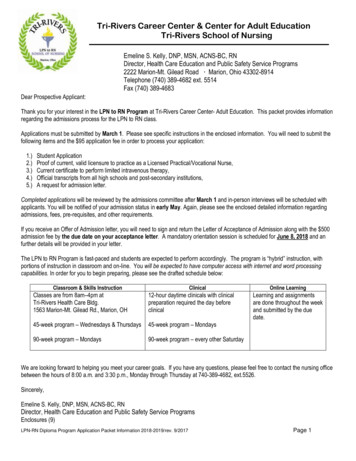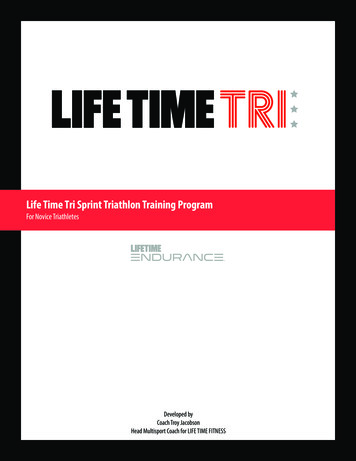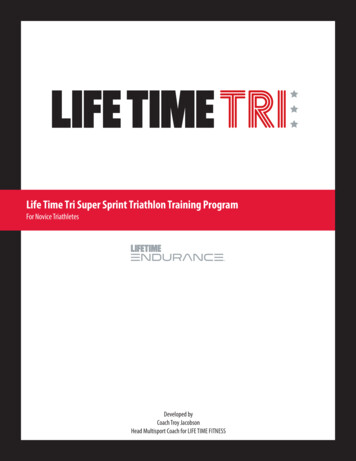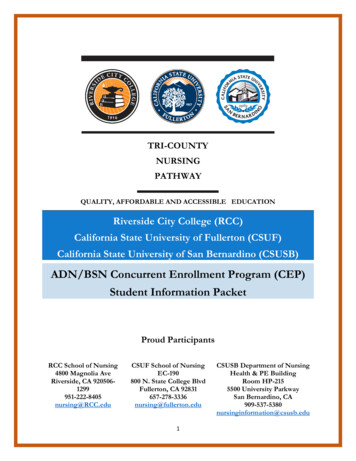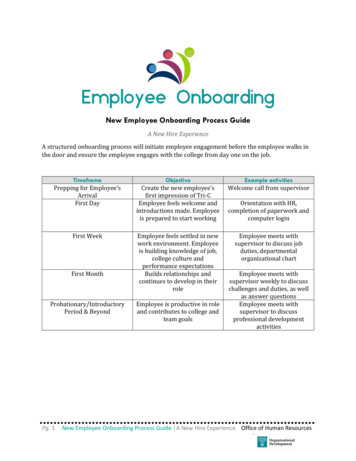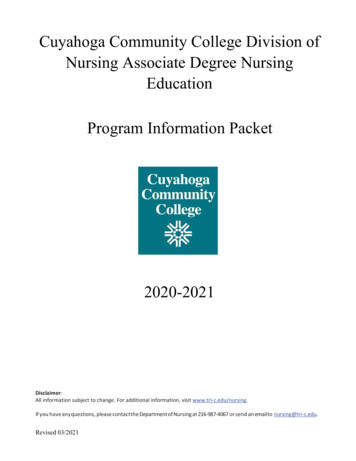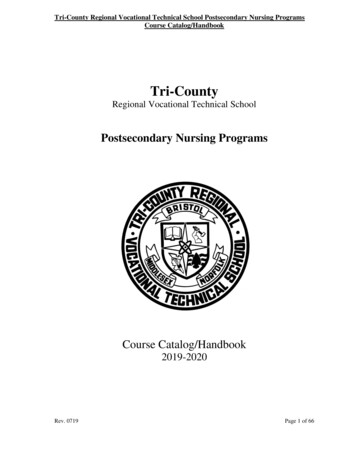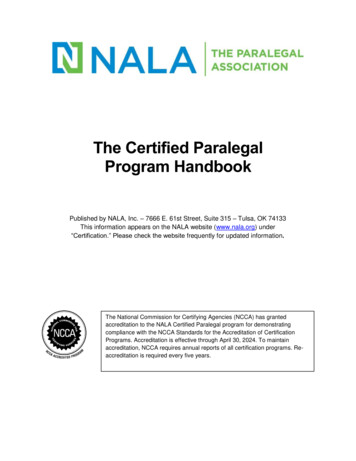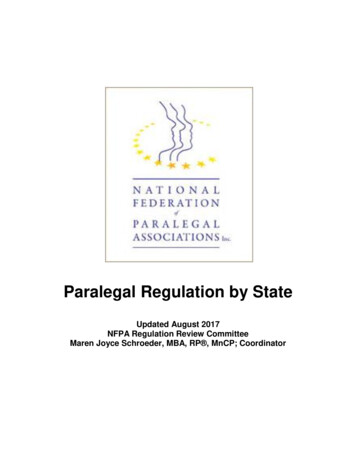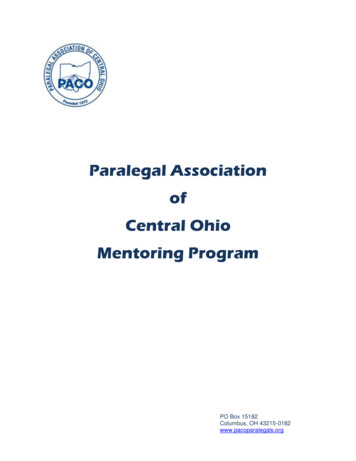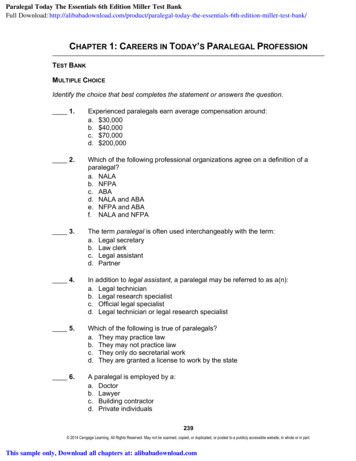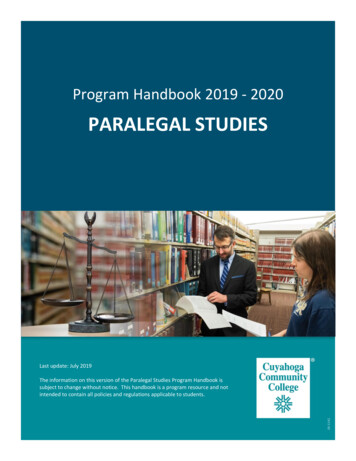
Transcription
Program Handbook 2019 - 2020PARALEGAL STUDIESLast update: July 2019The information on this version of the Paralegal Studies Program Handbook issubject to change without notice. This handbook is a program resource and notintended to contain all policies and regulations applicable to students.S
IntroductionThe purpose of this handbook is to inform and guide students on program specific requirements andexpectations.The Cuyahoga Community College Board of Trustees, Faculty and Administration reserve the right tochange, at any time, without notice, graduation requirements, tuition, books, fees, curriculum, coursestructure and content, and such other matters within its control, including information set forth in thishandbook.i
Table of ContentsSection I – Welcome Letter .1Section II – Program Description.21. Mission, Vision and Philosophy. 22. Program History. 23. Core Values. 24. Description of the Profession. 25. Professional Memberships . 36. Program Faculty and Staff. 4Section III – Program Expectations .51. Professional Standards . 52. Code of Ethics . 53. Program Learning Outcomes . 54. Professional Attire Requirements . 65. Student Code of Conduct . 66. Health and Physical Requirements . 6Section IV – Academic Requirements and Progression .71. Degree Requirements . 72. Attendance . 73. Absence Policy . 74. Illness. 75. Scheduling . 8Section V – Academic Status.81. Grading . 82. Grade Point Average (GPA) . 83. Program Withdrawal, Probation, Dismissal, and Reinstatement. 84. Due Process . 9ii
5. Student change of contact information . 9Section VI – Language Proficiency Requirements .9Section VII – Student Resources .91. Tutoring . 92. Student Accessibility Services . 103. Student Safety . 104. Other Resources . 10Section VIII – Accreditation and Credentialing . 101. College and Academic Program Accreditation . 102. Boards, National and/or State Testing . 11Section IX – Costs . 131. Tuition and Fees . 132. License, application, certification and/or examination costs . 133. Financial responsibility . 134. Supplies . 13Section X – Field and Clinical Experiences . 131. Clinical Experience . 132. Internships, Practicums, Field Experience, and Cooperative Education . 133. Service Requirements . 144. Performance Expectations . 155. Holidays . 156. Hours . 157. Emergency Closures and Inclement Weather . 15APPENDICES. 16Appendix I – Glossary of College and Program Terminology . 16Appendix II – Handbook Acknowledgement Form . 20Additional Content to be Included . Error! Bookmark not defined.iii
Section I – Welcome LetterWelcome to Tri-C's Paralegal Studies Program! Congratulations on taking the first step toward your legalcareer. We are excited to assist and support you in reaching your educational goals as you make your waythrough the program. This handbook contains important information and resources to be aware of as youstart your journey.The Paralegal Studies faculty and adjuncts are experienced attorneys who not only bring their knowledgeand expertise to the classroom, but are an integral part of your transformation into a legal professional.Throughout the Paralegal Studies Program, you will be introduced to a variety of areas of law andpotential career paths. You will graduate from the program with a solid legal foundation and practicalexperience, supplemented by specialty legal education based on the electives you choose. Takeadvantage of the activities, events, and memberships available to you as a student, including the studentled Paralegal Professionals Organization.A career in law is a rigorous, but rewarding, vocation. You will be challenged by your coursework and as aresult, you will sharpen your communication skills, problem solving skills, and time management skills, toname a few. We are here to support and encourage you along the way - do not hesitate to reach out tous!Best,Candice Storey, J.D.Program Director, Paralegal Studies1
Section II – Program Description1. Mission, Vision and PhilosophyThe College Mission:To provide high quality, accessible and affordable educational opportunities and services — includinguniversity transfer, technical and lifelong learning programs —that promote individual development andimprove the overall quality of life in a multicultural community.Paralegal Studies Program Mission:The primary mission and goal of Cuyahoga Community College’s Paralegal Studies Program is to meet theparalegal needs of Northeast Ohio’s legal community by educating and graduating ethical and competentparalegals, prepared to serve in both public and private environments, and ready to adapt to the everchanging legal landscape.2. Program HistoryTri-C's Paralegal Studies Program was first offered in 1991 and has been continuously approved by theAmerican Bar Association (ABA) since 1994. Over 1,000 students have graduated from the ParalegalStudies Program, the majority of whom are working in Northeast Ohio. Our program is fortunate to beadvised by a committee comprised of local attorneys, former judges, paralegals, and communitystakeholders, who bring a wealth of information and ideas to the table. Our program's excellentreputation is due to our commitment to high quality legal education and the success of our graduates.3. Core ValuesTo successfully fulfill the mission and vision, Cuyahoga Community College is consciously committed todiversity, integrity, academic excellence, and achievement of individual and institutional goals. We arededicated to building trust, respect, and confidence among our colleagues, students, and the community.3354:1-42-01 College Policy on affirmative action, inclusive excellence, equal opportunity, discrimination,and ity-discrimination-and-harassment.pdf4. Description of the ProfessionAs defined by the ABA, a paralegal is a person, qualified by education, training or work experience who isemployed or retained by a lawyer, law office, corporation, governmental agency or other entity and whoperforms specifically delegated substantive legal work for which a lawyer is responsible.2
Paralegals typically do the following: Investigate and gather the facts of a caseConduct research on relevant laws, regulations, and legal articlesOrganize and maintain documents in paper or electronic filing systemsGather and arrange evidence and other legal documents for attorney review and case preparationWrite or summarize reports to help lawyers prepare for trialsDraft correspondence and legal documents, such as contracts and mortgagesGet affidavits and other formal statements that may be used as evidence in courtHelp lawyers during trials by handling exhibits, taking notes, or reviewing trial transcriptsFile exhibits, briefs, appeals and other legal documents with the court or opposing counselCall clients, witnesses, lawyers, and outside vendors to schedule interviews, meetings, anddepositionsHelp lawyers prepare for hearings, trials, and corporate meetings.Paralegals use technology and computer software for managing and organizing the increasing amount ofdocuments and data collected during a case. Many paralegals use computer software to catalogdocuments, and to review documents for specific keywords or subjects. Because of these responsibilities,paralegals must be familiar with electronic database management and be current on the latest softwareused for electronic discovery. Electronic discovery refers to all electronic materials obtained by the partiesduring the litigation or investigation. These materials may be emails, data, documents, accountingdatabases, and websites.Paralegals’ specific duties often vary depending on the area of law in which they work. For moreinformation, please see the Bureau of Labor Statistics, Occupational Outlook Handbook for Paralegals al-assistants.htm#tab-1.5. Professional MembershipsThe following professional organizations are invaluable as you begin your legal career and beyond:Cleveland Association of Paralegals (CAP)CAP has been, and continues to be, instrumental in allowing paralegals to keep up to date with therapid growth and technological changes in various legal sectors while advancing continuingeducation and the individual role of the paralegal in executing legal services.https://www.capohio.org/Cleveland Metropolitan Bar Association (CMBA)The CMBA is a nonprofit professional organization dedicated to serving the needs of legalprofessionals in Greater Cleveland. A voluntary membership organization, our members includeattorneys and judges, law students, paralegals, and other business professionals. Together, we serveas the collective voice of our legal profession, both bench and bar.https://www.clemetrobar.org/cmba prod/cmba/Default.aspx?WebsiteKey bd5c4afd-969a-412d9aa2-9b677d28e1a93
National Federation of Paralegal Associations (NFPA)Founded in 1974, NFPA was the first national paralegal association. Created as a non-profitfederation, NFPA is an issues-driven, policy-oriented professional association directed by itsmembership. It is comprised of more than 50 member associations and represents over 9,000individual members reflecting a broad range of experience, education and ex.cfm?pageid 1National Association of Legal Assistants (NALA)The National Association of Legal Assistants (NALA) is the leading paralegal association in the U.S. Itsmission is to provide continuing education and professional development to all paralegals. NALAprovides current information about the profession, continuing education programs (publications,courses and webinars), networking opportunities, professional certification programs, occupationalsurvey reports, and publications to help paralegals excel in the workplace. NALA is a non-profitorganization, 501(c)(6), representing more than 18,000 paralegals, who are individual members ormembers of NALA affiliated associations.https://www.nala.org/*Tri-C's Paralegal Studies Program has an active membership with the ABAhttps://www.americanbar.org/groups/paralegals/ and the American Association for Paralegal Educationhttps://www.aafpe.org/.*6. Program Faculty and StaffCandice Storey, J.D.Program n Campus, A-221B11000 West Pleasant Valley Road, Parma, OH 44130Jimi GonzalezProgram n Campus, C-245A11000 West Pleasant Valley Road, Parma, OH 44130Mardy Chaplin, J.D.Assistant n Campus, C-10811000 West Pleasant Valley Road, Parma, OH 441304
Joseph Fell, J.D.Assistant Professor216-987-5469Joseph.fell@tri-c.eduWestern Campus, C-24711000 West Pleasant Valley Road, Parma, OH 44130Section III – Program Expectations1. Professional StandardsPlease refer to the ABA Model Rules of Professional Conduct, which can be accessed athttps://www.americanbar.org/groups/professional responsibility/publications/model rules of professional conduct/.2. Code of EthicsIt is important to understand that paralegals cannot accept a case, set fees, give legal advice or representa client in court. Paralegals may not provide legal services directly to the public, except as permitted bylaw.A student enrolled in the Paralegal Studies Program is in the beginning phases of a career as a paralegaland should be aware of and adhere to the professional and ethical code of the paralegal profession. Inaddition to the Student Code of Conduct, students within the Paralegal Studies Program are also expectedto follow the applicable code of ethics outlined by the Ohio Rules of Professional urces/Rules/ProfConduct/profConductRules.pdf. Anystudents found to violate professional and ethical standards may be referred to the College’s StudentCode of Conduct.3. Program Learning OutcomesUpon completion of Cuyahoga Community College’s Paralegal Studies Program, graduates should be ableto:Professionalism & Ethics: Act in accordance with the rules of professional conduct, attorney and paralegalethical codes, and organizational policies which includes the adaptability and flexibility to work as aneffective member of a legal team in a variety of roles, as well as the ability to organize, prioritize, scheduleand track assignments and appointments to meet deadlines.Communication: Communicate appropriately and professionally, both verbally (including to prepare,conduct and summarize party, witness, and expert interviews to aid in case development) and in writing5
(including pleadings, contracts, discovery, briefs, motions, forms, etc.) to diverse audiences whilemaintaining confidentiality and data security.Legal Technology: Use the latest technology and software utilized by the legal community to ensureaccurate billing and timekeeping, file and maintain case information, and prepare accurate legaldocuments and correspondence.Legal Research: Demonstrate research and investigative skills to analyze fact patterns; identify legalissues; locate, apply, and properly cite law with proficiency in both printed and online resources.Critical Thinking, Analysis, & Problem Solving: Demonstrate effective legal knowledge and practical skillsnecessary to perform substantive legal work under the direction of an attorney, while maintaining a clientservice ficate/4. Professional Attire RequirementsWhile there is no prescribed professional attire requirements for students attending classes during theprogram, students are expected to wear professional attire during the duration of their practicumexperience. A suit should be worn to the initial interview/meeting, and firm/organization custom shouldbe followed thereafter. Many legal employers adhere to a business casual dress code, but others may bemore formal/conservative.5. Student Code of ConductThe College acknowledges the importance of an environment that is conducive to learning. The StudentConduct Code and Judicial System serves to provide such an atmosphere that is conducive to educationgrowth and civility which fosters and protects the mission of the College. College Procedures on StudentConduct: Student Conduct Code and Student Judicial System , and Student Judicial System.6. Health and Physical RequirementsNot ApplicableFor more information on health requirements for health programs, this link provides a guide andresources: Health Careers and Nursing Immunization and Health Requirements.6
Section IV – Academic Requirements and Progression1. Degree RequirementsAssociate of Applied Business in Paralegal l-studies-aab/#programsequencetextPost-Degree Professional Certificate in Paralegal gramsequencetext2. AttendanceStudents are expected to adhere to established College, program and course attendance guidelines:Student Rights and Responsibilities - AttendancePlease keep in mind that the most successful students are typically those who regularly attend class andparticipate.3. Absence PolicyParalegal students are expected to inform their professor whenever illness or emergency necessitates anabsence of class. Please refer to course syllabus for each instructor's policy.4. IllnessStudents should report an infectious disease, transmissible from person to person or by direct contactwith an affected individual or the individual's discharges, or by indirect means. The Ohio AdministrativeCode (OAC) provides guidance through the Communicable Disease ng.pdf?MOD AJPERES&CONVERT TO url&CACHEID ROOTWORKSPACE.Z18 -7ce4eeb34680-mtn9-.6.The Ohio Administrative Code (OAC) provides guidance through the Communicable Disease Rule.Diseases to report: http://codes.ohio.gov/oac/3701-3-02v1.For a student who is infected with one of these illnesses and, if the illness occurs on camp
Paralegal Studies Program Mission: The primary mission and goal of uyahoga ommunity ollege’s Paralegal Studies Program is to meet the paralegal needs of Northeast Ohio’s legal community by educating and graduating ethical and competent paralegals, prepared to serve in both public
